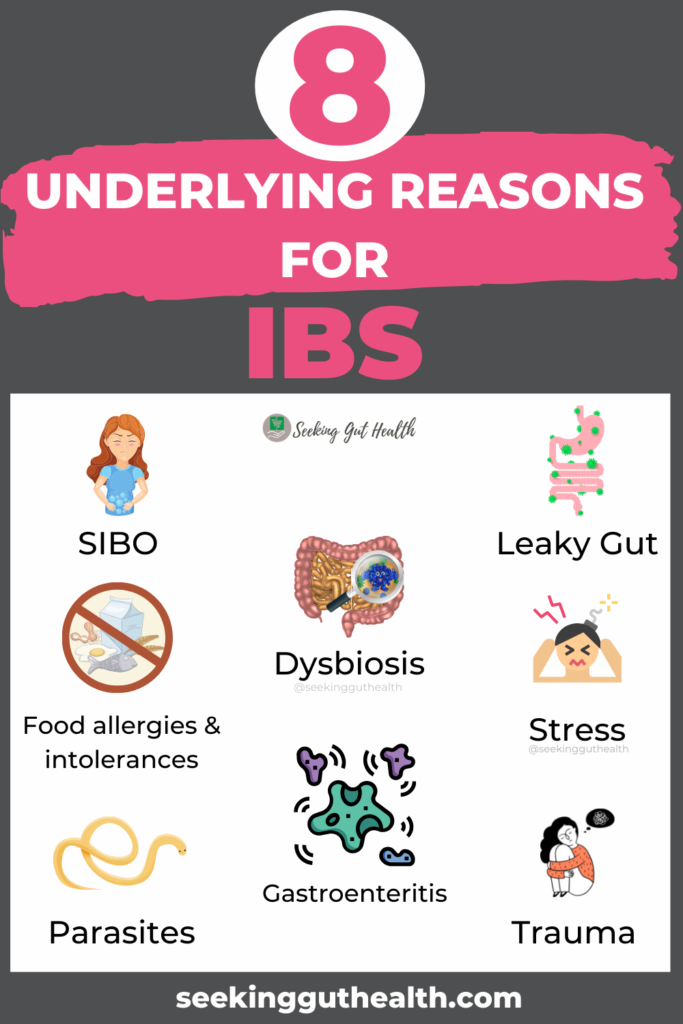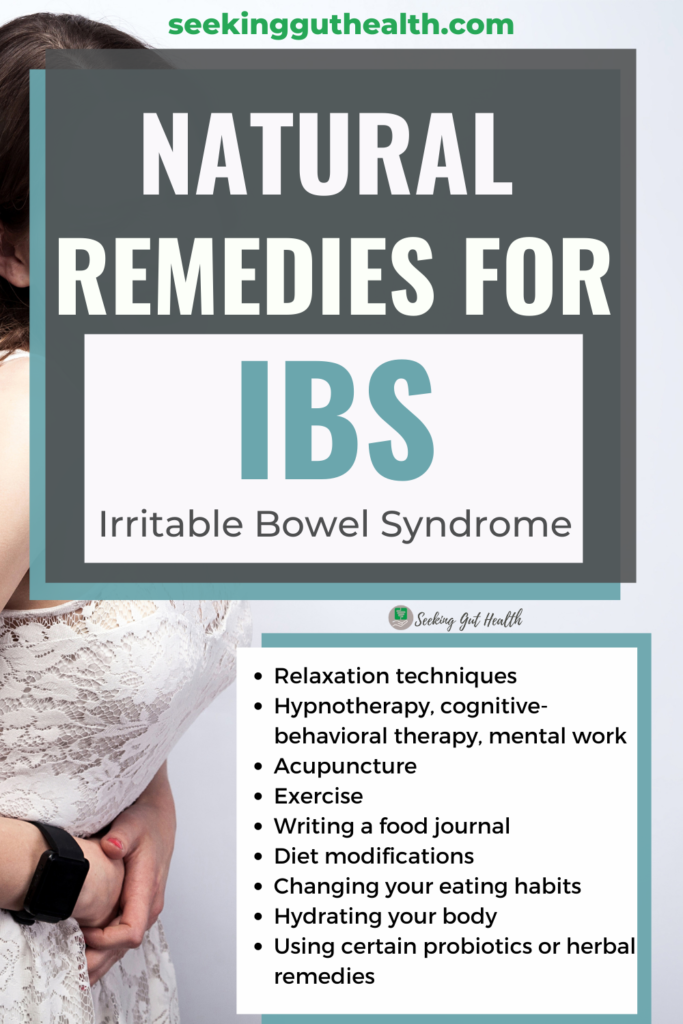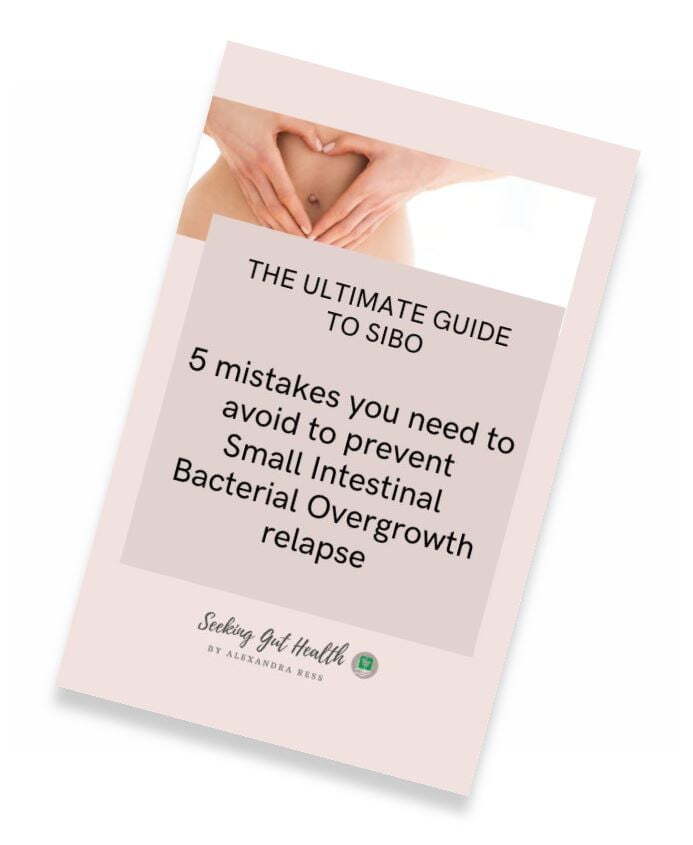Is IBS a common diganosis?
IBS means Irritable Bowel Syndrome.
More than 30 million people have been diagnosed with IBS in the USA alone(1), and IBS affects around 11% of the population globally. From this population, the prevalence of IBS in women is about 67% higher than in men. (2) The numbers are probably even higher as not everyone goes to their doctor, and the diagnostic criteria may also differ.
People usually got the IBS label after all their tests came back negative. Some of them (including me!) were dismissed by their doctors that their symptoms are only in their heads. Is it, though?
Are you also one of those people who got an IBS diagnosis but still suffer from the symptoms?
Then read further.

What is IBS?
IBS is a functional disorder, which affects the digestive system and includes a group of symptoms such as abdominal pain, cramping, bloating, increased gas, diarrhea (IBS-D), or constipation (IBS-C), or mixed (IBS-M), changed bowel movements. (3)
Unfortunately, IBS can be a chronic condition, meaning it lasts a long time (often years), which can be pretty frustrating and influence the quality of your life.
On the bright side, not all people suffering from IBS experience life-long symptoms. Sometimes the symptoms may come and go. Indeed, if your symptoms aren't that serious, you can easily manage IBS by following a healthy diet and lifestyle changes. But I believe that everything has a reason, and it is crucial to dig deeper to find the root cause of it rather than just manage it.
IBS Signs and Symptoms
The signs and symptoms of IBS can differ and vary from person to person. The symptoms can get worse, but sometimes they can either improve or disappear altogether.
Here are the most common IBS symptoms:
- Stomach pain, cramps, and bloating, which are usually relieved by passing stool
- Constipation or diarrhea, or sometimes both
- The feeling of incomplete bowel emptying
- Traces of mucus in the stool and excess gas (4)
There are also non-GI-related symptoms that may accompany IBS, such as anxiety and depression. (5)
It's important to mention if you have severe symptoms, you should seek medical help and support.
How is IBS diagnosed?
Conventional medicine set up the diagnosis according to the Rome III criteria.
This classification means that:
- the first symptoms appeared at least 6 months ago,
- the reoccurrence of the symptoms was regular in the last three months,
- containing changes in the form of stool and frequency of bowel movements,
- symptoms got better after a bowel movement.
Rome IV criteria includes several changes on how to approach this functional disorder. (6)
IBS chek test is also available on the market to diagnose IBS with predominant diarrhea (IBS-D) and mixed symptoms (IBS-M). This blood testing looks for anti-CdtB and anti-vinculin antibodies, the markers of a food poisoning event. These antibodies can attack the gut's nerves and impair the gut's cleaning wave. (7)
Generally, it is said that the causes of IBS are still unknown, but I don't think that it is entirely true. Everything has a reason, either physical or emotional. However, it can indeed be tricky to identify the underlying causes or contributing factors.
So let's have a look at some of the causes of IBS symptoms.
What are the 8 underlying reasons for IBS?
1. SIBO (Small Intestinal Bacterial Overgrowth)
Studies suggest that up to 84% of people with IBS actually have SIBO. (8) It is defined as excessive bacteria or changes in the types of bacteria in the small bowel. The bacteria in our intestines ferment specific carbohydrates, and they produce gases as a byproduct. This would be a normal process in the colon, but the problem occurs when bacteria gets translocated and start overgrowing in the small intestine causing digestive symptoms. This condition shares almost the same symptoms as IBS. SIBO is usually diagnosed with a lactulose or glucose breath test. (9)
Bear in mind that diagnosing SIBO might be just the first step because it won't tell you what caused your SIBO. Improving digestive functions and finding the underlying causes is crucial to prevent relapsing.
Imagine taking back control of your body and living bloat-free. Download your free guide and learn the 5 MISTAKES you need to AVOID TO PREVENT SMALL INTESTINAL BACTERIAL OVERGROWTH RELAPSE.
Grab your copy today!
2. Gastroenteritis
Gastroenteritis is yet another cause of IBS. It is a condition that causes diarrhea and vomiting resulting from a bacterial or viral infection in the stomach and intestines. While most people recover fully after an episode of acute infection, some people don't, and they continue to experience these uncomfortable symptoms (bloating, diarrhea). Hence the term of post-infectious IBS (PI-IBS). (10) Bacterial infections are primarily responsible for persistent symptoms.
Altered intestinal permeability and chronic inflammation processes are part of PI-IBS. (11)
3. Leaky Gut
Leaky gut or with another name: Intestinal permeability also plays a role in IBS patients' life. (12) Leaky gut is a condition when the intestines' lining gets damaged. There is a tight barrier in the gut that controls what gets absorbed into the bloodstream. But when it is damaged, then undigested food particles, bacteria, and toxins can get through the tissues into the bloodstream. These foreign substances can trigger the immune system and cause inflammation. Leaky gut, besides genetic predisposition and exposure to specific environmental triggers, can even start autoimmune responses. (13)(14)
4. Food Allergies and Intolerances
These are also common culprits of IBS.
Food allergy symptoms appear almost immediately after consuming the triggering food, resulting in hives or even anaphylactic shock. Patients are usually well aware of those problematic foods.
Food intolerance means being intolerant to a particular food. Symptoms are usually delayed from several hours to days after the ingestion of a specific food, causing digestive disturbances such as pain, bloating, diarrhea, or constipation.
IBS patients usually report sensitivities to high-FODMAP-containing foods. FODMAP means fermentable oligosaccharides, disaccharides, monosaccharides, and polyols, which are common triggers. These can include legumes, onions, lactose-containing foods, fatty foods, stone fruits, artificial sweeteners (xylitol), etc. Furthermore, gluten is also considered to be a triggering factor that damages the intestinal barrier function. (15)
Leaky gut can also be a contributing factor in terms of food allergies and intolerances. (16)
5. Parasite infection
Parasites live in a symbiotic relationship with a host. They can be found either on the surface of or inside another organism (the host) and get their food from the host. Parasites can be classified in many different ways. It is beyond the scope of this post to describe the various types of parasites and their effects.
Many people assume they need to travel to developing countries to catch a parasite infection. Sure, it is true, but nowadays you can get it more easily from:
- animals / pets
- contaminated water such as lakes, rivers
- contaminated foods - unwashed raw vegetables, fruits, or undercooked meat or fish
- public swimming pools
- poor hygiene practices
IBS symptoms can overlap with common intestinal parasite infections. Studies described that "Protozoa, such as Blastocystis, Cryptosporidium, and Giardia spp, are common enteric parasites and their carriage is believed to be linked to IBS." (17)(18)
6. Microbiome Changes / Dysbiosis
Microbiome refers to the microbial community that resides in the intestines, which are crucial for being healthy. Research suggests that environmental factors such as diet, medication, and lifestyle apply a more significant influence on the gut microbiome than genetics.
According to research, people who suffer from IBS have an imbalance in gut bacterial communities ("dysbiosis"). In other words, they have different microflora from healthy people. (19) (20) This is important to address since gut microbiota has a massive effect on mechanisms of the gut-brain axis, visceral sensitivity, GI motility, and immune activation. (21)
A comprehensive stool test can help identify any imbalances.
7. Stress
It is believed that stress can trigger or amplify IBS symptoms. Bi-directional communication between the gut and the brain (gut-brain axis) can be disrupted due to chronic stress.
Chronic stress has many adverse effects on the body:
- Increase the sensitivity of the bowel, which is triggered by stressors
- Shuts down digestion, resulting in low stomach acid, altered motility that may lead to SIBO
- Chronic stress can keep us in a "fight or flight" response where our immune system is weakened, and then we can easily get exposed to infections
- Enhances the growth of intestinal pathogens (bad gut bugs) such as Campylobacter jejuni, Escherichia coli
- Decreases the level of the good gut bugs (non-pathogenic bacteria) such as Lactobacilli and Bifidobacteria that may lead to dysbiosis (15)
IBS is a stress-sensitive disorder; therefore, stress management should be a crucial part of the treatment. (22)
8. Trauma
According to studies, emotional or psychological trauma has also been linked to IBS. Many women with IBS mention previous abuse at some point in their lives. Unprocessed trauma can be stored in the bodies' tissues. This stored trauma typically leads to pain and progressively contributes to different health issues. (23)(24)
Choosing a form of therapy to help heal your trauma can also alleviate IBS symptoms. Nowadays, there are many types of treatments such as behavior, cognitive behavioral therapy, hypnotherapy, etc., you can choose.
Remember that healing from a traumatic event is more like a journey, a marathon rather than a sprint.
Of course, there are plenty of causes of IBS that are not listed here.

How can you deal with your IBS naturally?
First of all, it is essential to understand that the solution is highly dependent on the root cause of your IBS and your health situation.
Many conventional doctors recommend using laxatives or antispasmodics, antibiotics, antidepressants, and other agents, which can help with the symptoms but don't solve the root causes and may have many side effects. They indeed have their time and space in a treatment.
General natural approaches:
- Using relaxation techniques to manage stress
- Get an adequate amount of sleep
- Hypnotherapy, cognitive-behavioral therapy, mental work for traumas
- Acupuncture for stress, better nerve signaling
- Exercise (cycling, walking, yoga, Pilates)
- Writing a food journal to find the triggers
- Diet modifications – removing inflammatory and processed foods and cook homemade meals using fresh ingredients
- Studies show great success for following a low-FODMAP diet (although better to do it for short-term)
- Changing your eating habits (eat slowly)
- Hydrating your body
- Increasing (soluble) fiber intake, especially for IBS-C patients (4)
- Using certain probiotics or herbal remedies such as peppermint oil (avoid if you have reflux!), ginger extract
Complications
Several complications may occur due to IBS. For example, experiencing persistent and chronic diarrhea or constipation can lead to having hemorrhoids. Furthermore, following a strict diet may lead to nutrient deficiencies or unintended weight loss.
Having IBS is usually connected to having a poor quality of life and mood disorders.
You should seek medical help if you experience more severe symptoms, which include:
- Night-time diarrhea
- Rectal bleeding
- Swallowing difficulties
- Persistent, not relievable pain
- Weight loss
- Unexplained vomiting
Bottom line
IBS can be a chronic functional disorder with symptoms that negatively influence the quality of your life. It is essential to dig deeper and find any possible root causes or contributing factors to end the suffering. You can prevent or relieve IBS symptoms by managing stress and eating plenty of anti-inflammatory foods. You can try counseling, biofeedback, progressive relaxation exercises, mindfulness training, mindful eating, or whatever else works for you.
Since there are so many factors to consider and take care of, the best is to hire a Functional Nutrition Coach or any healthcare provider who follows a root cause approach and provides natural solutions.
If you have severe symptoms, seek medical support as soon as possible.
*This post is only for informational purposes; and not meant to diagnose or treat any disease. I advise consulting with your healthcare practitioner regarding any treatment options or dietary changes.
- Saito, Y. A., Schoenfeld, P., & Locke, G. R., 3rd (2002). The epidemiology of irritable bowel syndrome in North America: a systematic review. The American journal of gastroenterology, 97(8), 1910–1915. https://doi.org/10.1111/j.1572-0241.2002.05913.x
- Canavan, C., West, J., & Card, T. (2014). The epidemiology of irritable bowel syndrome. Clinical epidemiology, 6, 71–80. https://doi.org/10.2147/CLEP.S40245
- "Definition and Facts for Irritable Bowel Syndrome". NIDDKD. February 23, 2015. Archived from the original on April 2, 2016. Retrieved March 29, 2016.
- Saha L. (2014). Irritable bowel syndrome: pathogenesis, diagnosis, treatment, and evidence-based medicine. World journal of gastroenterology, 20(22), 6759–6773. https://doi.org/10.3748/wjg.v20.i22.6759
- Midenfjord, I., Polster, A., Sjövall, H., Törnblom, H., & Simrén, M. (2019). Anxiety and depression in irritable bowel syndrome: Exploring the interaction with other symptoms and pathophysiology using multivariate analyses. Neurogastroenterology and motility : the official journal of the European Gastrointestinal Motility Society, 31(8), e13619. https://doi.org/10.1111/nmo.13619
- Lacy, B. E., & Patel, N. K. (2017). Rome Criteria and a Diagnostic Approach to Irritable Bowel Syndrome. Journal of clinical medicine, 6(11), 99. https://doi.org/10.3390/jcm6110099
- Rezaie, A., Park, S. C., Morales, W., Marsh, E., Lembo, A., Kim, J. H., Weitsman, S., Chua, K. S., Barlow, G. M., & Pimentel, M. (2017). Assessment of Anti-vinculin and Anti-cytolethal Distending Toxin B Antibodies in Subtypes of Irritable Bowel Syndrome. Digestive diseases and sciences, 62(6), 1480–1485. https://doi.org/10.1007/s10620-017-4585-z
- Dukowicz, A. C., Lacy, B. E., & Levine, G. M. (2007). Small intestinal bacterial overgrowth: a comprehensive review. Gastroenterology & hepatology, 3(2), 112–122.
- Bures, J., Cyrany, J., Kohoutova, D., Förstl, M., Rejchrt, S., Kvetina, J., Vorisek, V., & Kopacova, M. (2010). Small intestinal bacterial overgrowth syndrome. World journal of gastroenterology, 16(24), 2978–2990. https://doi.org/10.3748/wjg.v16.i24.2978
- Lee, Y. Y., Annamalai, C., & Rao, S. (2017). Post-Infectious Irritable Bowel Syndrome. Current gastroenterology reports, 19(11), 56. https://doi.org/10.1007/s11894-017-0595-4
- Serghini, M., Karoui, S., Boubaker, J., & Filali, A. (2012). Une nouvelle entité clinique: le syndrome de l'intestin irritable postinfectieux [Post-infectious irritable bowel syndrome]. La Tunisie medicale, 90(3), 205–213.
- Camilleri, M., & Gorman, H. (2007). Intestinal permeability and irritable bowel syndrome. Neurogastroenterology and motility : the official journal of the European Gastrointestinal Motility Society, 19(7), 545–552. https://doi.org/10.1111/j.1365-2982.2007.00925.x
- Fasano A. (2020). All disease begins in the (leaky) gut: role of zonulin-mediated gut permeability in the pathogenesis of some chronic inflammatory diseases. F1000Research, 9, F1000 Faculty Rev-69. https://doi.org/10.12688/f1000research.20510.1
- Mu, Q., Kirby, J., Reilly, C. M., & Luo, X. M. (2017). Leaky Gut As a Danger Signal for Autoimmune Diseases. Frontiers in immunology, 8, 598. https://doi.org/10.3389/fimmu.2017.00598
- Hadjivasilis, A., Tsioutis, C., Michalinos, A., Ntourakis, D., Christodoulou, D. K., & Agouridis, A. P. (2019). New insights into irritable bowel syndrome: from pathophysiology to treatment. Annals of gastroenterology, 32(6), 554–564. https://doi.org/10.20524/aog.2019.0428
- Rapin, J. R., & Wiernsperger, N. (2010). Possible links between intestinal permeability and food processing: A potential therapeutic niche for glutamine. Clinics (Sao Paulo, Brazil), 65(6), 635–643. https://doi.org/10.1590/S1807-59322010000600012
- Haque R. (2007). Human intestinal parasites. Journal of health, population, and nutrition, 25(4), 387–391.
- Jadallah, K. A., Nimri, L. F., & Ghanem, R. A. (2017). Protozoan parasites in irritable bowel syndrome: A case-control study. World journal of gastrointestinal pharmacology and therapeutics, 8(4), 201–207. https://doi.org/10.4292/wjgpt.v8.i4.201
- Menees, S., & Chey, W. (2018). The gut microbiome and irritable bowel syndrome. F1000Research, 7, F1000 Faculty Rev-1029. https://doi.org/10.12688/f1000research.14592.1
- Collins S. M. (2014). A role for the gut microbiota in IBS. Nature reviews. Gastroenterology & hepatology, 11(8), 497–505. https://doi.org/10.1038/nrgastro.2014.40
- Bhattarai, Y., Muniz Pedrogo, D. A., & Kashyap, P. C. (2017). Irritable bowel syndrome: a gut microbiota-related disorder?. American journal of physiology. Gastrointestinal and liver physiology, 312(1), G52–G62. https://doi.org/10.1152/ajpgi.00338.2016
- Qin, H. Y., Cheng, C. W., Tang, X. D., & Bian, Z. X. (2014). Impact of psychological stress on irritable bowel syndrome. World journal of gastroenterology, 20(39), 14126–14131. https://doi.org/10.3748/wjg.v20.i39.14126
- Halland, M., Almazar, A., Lee, R., Atkinson, E., Larson, J., Talley, N. J., & Saito, Y. A. (2014). A case-control study of childhood trauma in the development of irritable bowel syndrome. Neurogastroenterology and motility : the official journal of the European Gastrointestinal Motility Society, 26(7), 990–998. https://doi.org/10.1111/nmo.12353
- White, D. L., Savas, L. S., Daci, K., Elserag, R., Graham, D. P., Fitzgerald, S. J., Smith, S. L., Tan, G., & El-Serag, H. B. (2010). Trauma history and risk of the irritable bowel syndrome in women veterans. Alimentary pharmacology & therapeutics, 32(4), 551–561. https://doi.org/10.1111/j.1365-2036.2010.04387.x

Alexandra is a Functional Medicine Certified Health Coach & Holistic Nutritionist specializing in IBS, SIBO, and Gut Health. She helps her clients identify the root causes of their chronic gut issues with functional testing, supporting their bodies holistically and implementing the necessary lifestyle changes long-term to regain control of their bodies and enjoy food freedom. Book your FREE SIBO Assessment call now >>>

